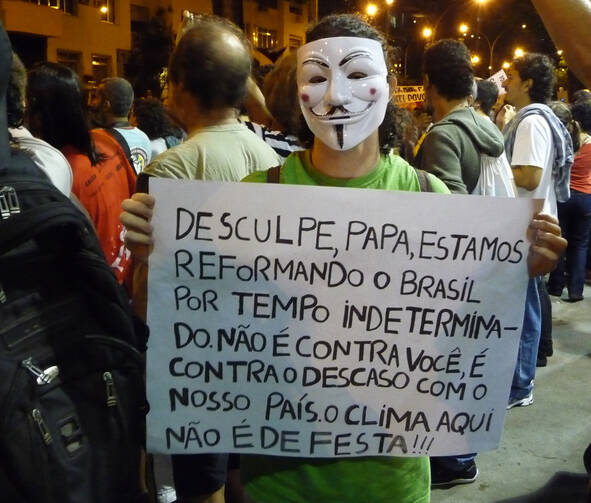Speaking to political, economic and cultural leaders in Brazil, a country recently shaken by anti-government protests, Pope Francis called for a "culture of encounter" and said dialogue is the only way to promote social peace.The pope made his remarks on July 27 in Rio's Municipal Theater, to an audience representing what the Vatican's official schedule described as the "ruling class of Brazil."
"When leaders in various fields ask me for advice, my response is always the same: dialogue, dialogue, dialogue," he said. "Today, either we stake all on dialogue, on the culture of encounter, or we all lose." The pope did not explicitly refer to the series of demonstrations in Brazilian cities that started last month, aimed at a range of grievances, including government corruption, unsatisfactory public education and health services, the high cost of public transportation and police brutality. But he pointed to dialogue as a third way "between selfish indifference and violent protest."
"A country grows when constructive dialogue occurs between its many rich cultural components: popular culture, university culture, youth culture, artistic and technological culture, economic culture, family culture and media culture," he said.
Pope Francis also called on his listeners to share "fraternal responsibility" for Brazilian society, "rehabilitating politics, which is one of the highest forms of charity."
"The future demands of us a humanistic vision of the economy and a politics capable of ensuring greater and more effective participation on the part of all, eliminating forms of elitism and eradicating poverty," he said.
Noting the importance of Christianity to the country's cultural heritage, the pope said the church offered an "integral vision of the human person" that is "true to Brazilian identity and capable of building a better future for all."
"Christianity combines transcendence and incarnation," he said. "It brings ever new vitality to thought and life, in contrast to the dissatisfaction and disillusionment which creep into hearts and spread in the streets."
Yet the pope endorsed the separation of church and state, historically a volatile topic in Latin America, where the Catholic Church long held a privileged legal position in many countries, but where it has more recently clashed with governments over issues, including abortion and same-sex marriage. He said such separation favors "peaceful coexistence between different religions," since the state, "without appropriating any one confessional stance, respects and esteems the presence of the religious factor in society, while fostering its concrete expressions."
The pope also had words of caution and hope for those who have taken to the streets. The street protests involving hundreds of thousands of mostly young people in cities across Brazil, and in other countries, are a sign of the youths' desire for a more just world, but Christians must ensure the protests are peaceful and that efforts to improve society are guided by Christian values, Pope Francis said.
The pope's remarks on July 27 during the nighttime World Youth Day vigil marked his first reference to the demonstrations, which broke out in June to protest a range of grievances, including government corruption, unsatisfactory public education and health services, the high cost of public transportation and police brutality. "In your young hearts, you have a desire to build a better world," the pope told the young people. "I have been closely following the news reports of the many young people who, in many parts of the world and here in Brazil, have taken to the streets in order to express their desire for a more just and fraternal society."
But it is not enough to protest, he said. "I encourage you—in an orderly, peaceful and responsible way, motivated by Gospel values—to continue to overcome apathy and offer a Christian response to the social and political concerns present in your countries."
And, he said, there is only one place to begin to make that change.
"Mother Teresa of Kolkata was once asked what needed to change in the church. Her answer was: 'You and I,'" and the same goes for changes in the world, the pope said.








